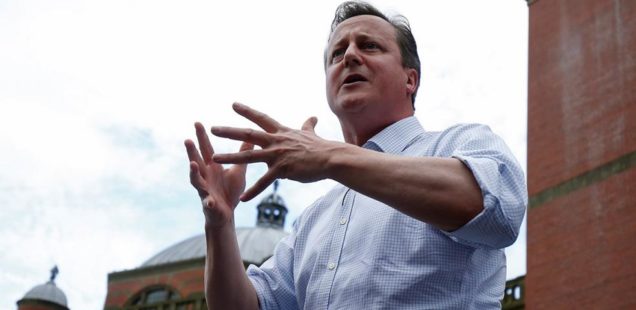
3 Ways Cameron Can Unify Britain If Voters Reject Brexit
When polls close tonight on the national referendum on European Union membership, Britons will choose to remain in the EU or they will choose a “Brexit.” But this vote will stand as a huge defeat for Europe either way.
In the final days before polls opened, it looked (marginally) likely that the “In” camp, led by David Cameron, would prevail. But any thought that this lands the British prime minister on Easy Street is out of the question.
Cameron will immediately have to offer the Ins—as well as all the “Outs” who opposed him—answers to ever more pressing questions. Britain is remaining a member of exactly what and why?
Related: Brexit: Who’s Really to Blame for Europe’s Mess
The European project, after six years of incessant crises and miscalculated responses, is a discredited shambles. The very problems that drove Cameron to offer Britons a referendum three years ago remain unresolved.
We’ve all got skin in this game. Apart from the numerous practicalities in question, if the EU now rests on nothing more than historical momentum, bureaucratic imperative and political fictions, there’s less hope than we thought for 21st century global institutions.
Oddly, Jeremy Corbyn had the best take on the predicament Cameron faces if he manages to reaffirm British membership. “It’s a turning point,” the Labor Party leader said in the final days before the June 23 vote. “If we stay in Europe, there are implications. If we leave Europe, there are massive implications.”
Corbyn, who is approximately the Bernie Sanders of British politics, is a longtime euroskeptic but favors continued EU membership. “If we stay, I think Europe has to change dramatically,” he asserted.
Related: How a Brexit Could Sink Clinton and Hand the Election to Trump
That ranks among the truest things said during months of heated, hyperbolic campaigning by both sides. And it’s a point on which Britain and the EU can converge, providing their leaders are smart enough to grasp it: Europe is in urgent need of restorative reform and Cameron can make political capital among restive Britons if he is seen to push the EU toward it.
It’s now six years since EU tumbled into what stands among the worst periods in its history. The financial and economic crises that began in 2010 prompted years of austerity that turned out not to induce recovery as much as inhibit it.
The Greek crisis revealed a shocking streak of anti-democratic thinking in the Brussels and Frankfurt power centers. Then the flow of Middle Eastern and North African migrants was met with disarray and self-interested policies among members nominally favoring unified responses to Europe’s challenges.
Finally, there is the obstinate inflexibility that has greeted Britain’s complaints about regulatory overreach and unfairly distributed burdens within the EU structure. Even now, Brussels is said to be on the brink of introducing a new set of restrictionsgoverning toasters, lawnmowers, and other household appliances—just the sort of aggravating intrusion into everyday life that infuriates the Outs.
Related: How a Ban on Tea Kettles Could Drive Britain to a Brexit
Post-referendum, there’s little chance Cameron will address all of these problems—or prevail in all those cases he takes up. But he can adopt some as British causes and in the process lead the EU into the very reforms it needs to consider.
Here are three examples.
Immigration. Cameron is partially equipped to take on Brussels by way of an “emergency brake” he negotiated earlier this year. This allows Britain to phase in social benefits extended to new immigrants over a four-year period should there be a strain on public services.
Apart from this, Cameron has two other approaches at his disposal. One is to tie Britain’s complaints about the burden of immigration to the need for policies to address the recent influx of migrants. There is currently none.
Another is to encourage the EU to address the real problem prompting the ire of Outs in Britain and right wing parties elsewhere. The real problem is deindustrialization, not immigration. New studies show this. Making the point instantly deflates British and European xenophobes and identifies job-creation policies as the truly effective response.
Related: Brexit Explained: What It Is and How It Could Change the World
British sovereignty. Again, Cameron is partially armed on this point. He has already negotiated Britain out of the EU’s “ever closer union” principle—effectively fixing the limits of the relationship. As of his talks in Brussels earlier this year, he has a “red card” that allows members’ legislatures to vote against new EU laws.
This gives Cameron a strong argument to deploy at home: “If you want to ‘take back control,’” he can tell Britain’s Outs, “that’s done by asserting British power in EU councils. Don’t mistake isolation for a hollow display of sovereignty.”
EU contributions. On a net basis, Britain contributes about $14.6 billion a year to the EU’s budget—about $280 million a week. While the Outs have made a lot of hay out of these figures — embellishing them at every turn— if Cameron can’t win this argument, he doesn’t deserve to live at 10 Downing Street.
Britain’s annual contribution comes to 0.5 percent of its GDP and 1.3 percent of its national budget. Cameron won’t get far if he tries to whittle down British payments, but he won’t and doesn’t have to.
Put these payments against the economic benefits of membership in terms of jobs, trade flows, and numerous other measures, and Britain’s contributions look cheap at twice the price. This isn’t an argument Cameron should make in Brussels; It’s one he has to make at home, where economic recovery remains fragile. Even the Outs need Europe on this point.

